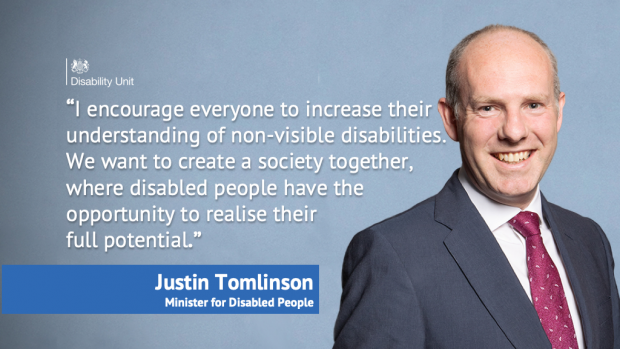
The International Day of People with Disabilities (IDPWD) is a United Nations-led day of recognition which takes place every year on 3 December. It promotes the rights of people with disabilities in all areas of society. It aims to increase the awareness and wellbeing of disabled people in all aspects of their life.
It acts as a reminder for us all to combat the discrimination many disabled people still face. As the Minister for Disabled People, I personally welcome the opportunity to promote awareness and discussion around improving outcomes for disabled people.
Why do we celebrate IDPWD?
IDPWD was founded in 1992 to celebrate people living with disabilities across the world. It symbolises the actions we should all take every day to create more diverse and accessible communities. IDPWD reminds us that there is still more to be done for equality.
The principles of IDPWD are:
- celebration
- learning
- optimism
- action
We celebrate and value diversity and all disabilities. We commit to listening to and better understanding disabled people. We are optimistic and look towards a future society which is accessible for all. We take action to show our support for disabled people today and every day of the year.
Not all disabilities are visible
The theme for International Day of People with Disabilities 2020 is "Not all disabilities are visible". Part of my work as Minister for Disabled People is to promote further understanding of all types of disability. This aims to open up a discussion about disabilities which are not immediately obvious. This will help to spread awareness and reduce stigma around disabilities which cannot be easily ‘seen’.
Non-visible illnesses might include:
- diabetes
- brain injuries
- chronic pain or fatigue
- neurological disorders
- autism
- mental health conditions
- hearing loss
Even though non-visible disabilities cannot be seen, they still exist. Even if some people with an understanding of them can identify a non-visible disability, most people usually can not. Visible and non-visible disabilities can be fluid. Someone may have a visible disability, such as rely on a walking aid for mobility, and also have a non-visible disability, such as a mental health condition.

What is different this year?
This year I am proud that we continue to celebrate IDPWD throughout the coronavirus (COVID-19) pandemic. We know this is impacting disabled people in a number of ways. Some disabled people may not be able to access services like they usually would. Other disabled people may have their normal routines affected. Some people are experiencing loneliness and isolation. Increasing our understanding of the challenges disabled people might be facing is important as we move through the pandemic.
When I speak to disabled people they stress the importance of continuing to raise awareness of non-visible disabilities. It is crucial to remember that some people, who have medical exemptions from wearing a face covering, have non-visible disabilities. Some people, who are medically exempt, have reported facing hostility in public for not wearing a face covering.
It is important to remember that people with non-visible disabilities are not required to explain their disability or prove they are medically exempt from wearing a face covering. Showing other people kindness and understanding will ensure everybody feels and is safe.
Disabled People’s Rights
The rights of disabled people in the United Kingdom are protected by law. The Equality Act of 2010 protects employment rights, access to goods, services and facilities, education and buying or renting land and property. This act also protects the rights of carers or parents who have an association with a disabled person. There is still work to be done and celebrating IDPWD helps us drive positive change.
To honour IDPWD, I encourage everyone to increase their understanding of non-visible disabilities. We want to create a society together, where disabled people have the opportunity to realise their full potential.
Make sure to follow us on Twitter to keep up-to-date on what we’re doing @DisabilityUnit.
1 comment
Comment by Kev Carrell posted on
It would be great, if you could convince the majority of GPs who blatantly ignore, and sometimes exaggerate an individuals reaction. To one of belligerence, rather than guaranteed reaction. Just because adult ADHD is seen as a cognitive function condition. Autism is a cognitive condition. Having both as I do. Really presents symptoms people think I should be able to control. Consequently, I received very little help on the first lock down. And sweet FA on the 2nd! I was even asked for my feedback from the ADDAD organisation. We had a video meeting. I told them that I was used to being lonely, but I have previously, never before felt alone.
This last lockdown. No one from the medical profession, or the alleged help groups aware of my problems, including the British Legion. Even bothered phoning.
You don't get used to that sort of thing. You just accept that you will probably experience it again and again.